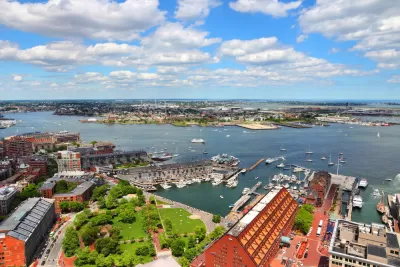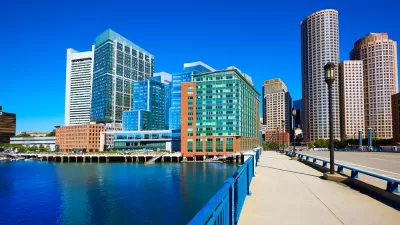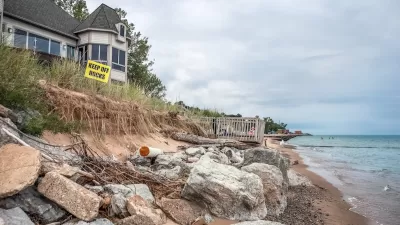A grant-funded research team will evaluate solutions for shoring up the area’s flood protection strategies and improving access and service on the Blue Line for local residents.

A study by A Better City will examine how improving Boston’s Blue Line can help mitigate the effects of climate change and protect public transit infrastructure on the city’s east side from rising sea levels, reports Grecia White for Streetsblog Massachusetts.
“As one of the few ways people can access Boston proper from East Boston without a car, the Blue Line is a critical transportation corridor that’s vulnerable to climate-related impacts and also to socio-economic pressures like gentrification.” According to the article, “The project, Greening the Blue Line, a collaboration between ABC, Civic Space Collaborative, and Weston and Sampson, will be evaluating the potential for nature based solutions to protect critical transportation infrastructure from coastal and stormwater flooding, and uplift communities along the Blue Line and East Boston, according to [Kate Dineen, Executive Vice President of A Better City].”
The study will assess “nature based solutions” for managing flooding and protecting transit stations and infrastructure near two Blue Line stations, Wood Island and Orient Heights. “At the end of the project, the team will share conceptual design approaches such as sketches and renderings for nature based solutions that could be implemented in key areas near these stations to help mitigate coastal flooding.”
FULL STORY: Blue Line in East Boston Is the Focus of Ongoing Climate Change Mitigation Study

Manufactured Crisis: Losing the Nation’s Largest Source of Unsubsidized Affordable Housing
Manufactured housing communities have long been an affordable housing option for millions of people living in the U.S., but that affordability is disappearing rapidly. How did we get here?

Americans May Be Stuck — But Why?
Americans are moving a lot less than they once did, and that is a problem. While Yoni Applebaum, in his highly-publicized article Stuck, gets the reasons badly wrong, it's still important to ask: why are we moving so much less than before?

Research Shows More Roads = More Driving
A national study shows, once again, that increasing road supply induces additional vehicle travel, particularly over the long run.

How Protecting Kauaʻi’s Forests Safeguards Fresh Water
A University of Hawaiʻi study shows that protecting Kauaʻi’s native forests from invasive species significantly boosts groundwater recharge, making it a cost-effective strategy to secure fresh water and enhance climate resilience.

Gary, Indiana to Expand Transit Service, Bike Share
The city plans to launch a bike share system in April and expand service on its bus routes.

Pittsburgh Rolls Out Electric School Buses
Pittsburgh Public Schools has launched its first electric school buses, with plans to fully electrify its fleet over the next 14 months, aiming to create a cleaner, more sustainable transportation system supported by new charging infrastructure.
Urban Design for Planners 1: Software Tools
This six-course series explores essential urban design concepts using open source software and equips planners with the tools they need to participate fully in the urban design process.
Planning for Universal Design
Learn the tools for implementing Universal Design in planning regulations.
City of Moreno Valley
Institute for Housing and Urban Development Studies (IHS)
City of Grandview
Harvard GSD Executive Education
NYU Wagner Graduate School of Public Service
City of Cambridge, Maryland
Newport County Development Council: Connect Greater Newport





























